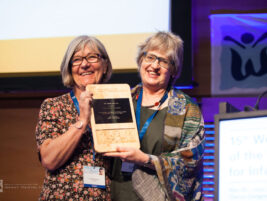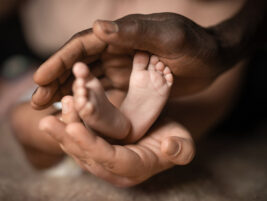This column focuses on the perspectives of clinicians/students who are engaged in infant mental health research at Masters and Doctoral level. It features a sample of current ethically approved research projects. The column aims to highlight the diversity of student research across the globe that is being conducted by WAIMH members, while also providing a global community of interest and support for each student’s research.
If you are a WAIMH member/WAIMH student member who is currently engaged in Masters or Doctoral research, and you have ethical approval for your study, we invite you to share a little bit about your study. This would entail providing the following:
- Project working title;
- Name of your institution and department;
- Name/s and institutions of your supervisors; and
- A working abstract about your research.
This column features two current doctoral research projects. The first project overviewed here is research being conducted by Ms S. Christine Bartram, The University of Warwick, Medical School, Division of Mental Health and Wellbeing, Coventry, UK. The second is being conducted by Angela Lisa McLaughlin (University of Edinburgh). Angela is in the final year of her PhD in Clinical Psychology. Her research was presented as a poster at the World Association for Infant Mental Health’s, World Congress (Edinburgh, 2014).
Title: The Neonatal Behavioral Assessment Scale (NBAS) for supporting caregivers and newborns in Keneba, the Republic of the Gambia: development, piloting and feasibility
Doctoral Researcher: Ms S. Christine Bartram, The University of Warwick, Medical School, Division of Mental Health and Wellbeing, Coventry, UK.
Email: S.C.Bartram@Warwick.ac.uk
Researchers at the MRC unit in Keneba (Republic of the Gambia, West Africa) are interested in using newborn behavior to evaluate the impact of early nutrition on infant cognitive development, but do not currently have a standardized tool available to assess infant behaviour during the neonatal period. This project aims to assess whether the Neonatal Behavioral Assessment Scale (NBAS) can be used with caregivers and infants in Keneba in a way that is acceptable, relevant, and desirable to the community.
The research involves four objectives, in line with MRC guidance for developing and evaluating complex interventions.
- Development: Systematic Review. To conduct a Cochrane systematic review to examine the NBAS’s evidence base and to identify moderating factors.
- Development: Contextualization. To conduct field observation in order to contextualize the project in terms of Keneba’s religious, cultural, and socioeconomic context, and to conduct semi-structured interviews (N = 30) to understand the experiences, goals and concerns of caregivers regarding themselves and their families, as reported by caregivers, paediatricians, and other community members, in order to determine whether the NBAS is likely to be relevant to caregivers and infants in the community.
- Piloting. To train two local staff to deliver the NBAS. To conduct a qualitative pilot study to assess receptivity to the NBAS, including pilot sessions with caregiver-infant dyads (N = 10) and two focus group discussions (N = 10 caregivers, N = 5 community members) regarding relevance and acceptability, and to suggest whether any modifications to the NBAS are needed for this context.
- Feasibility. To conduct a feasibility study of the NBAS as an intervention for improving caregiver and infant outcomes, namely, survival.
The project has been given funding and UK ethical approval; it is currently being considered for local (Gambian) ethical approval. The Cochrane protocol is pending publication and fieldwork is set to begin in March, 2015.
Supervisors:
Prof Jane Barlow. The University of Warwick, Medical School, Division of Mental Health and Wellbeing, Coventry, UK.
Prof Dieter Wolke. The University of Warwick, Medical School, Division of Mental Health and Wellbeing, Coventry, UK.
Title: THE BUTTERFLY EFFECT: Examining the impact of multiple adversities upon neurodevelopmental and attachment trajectories from foetal beginnings until infanthood
Doctoral Researcher: Ms Angela Lisa McLaughlin. University of Edinburgh, Scotland, UK.
She can be contacted by email at: s1152158@exseed.ed.ac.uk
Multiple adversities during the perinatal period poses real risks for mother and baby, yet little is known about the impact that such exposures have on early neurodevelopment and attachment. This PhD research, code-named Project Butterfly, is a prospective exploratory study asking the principle question: Can a Butterfly Effect be observed in the neurodevelopmental and attachment trajectories of babies exposed to multiple adversities from womb to cradle? These include exposure to: drugs (illicit, legal or prescribed), gender-based violence, inadequate nutrition, infectious diseases, maternal illness, maternal mental ill-health, poor social support, poverty, stress and trauma.
This research aims:
- To explore the neurodevelopmental trajectories of babies exposed to multiple adversities in utero and during the first four months of extrauterine life;
- To explore the attachment trajectories of dyads exposed to multiple adversities during this time;
- To explore whether the type, timing and frequency of the adversities experienced leads to differing neurodevelopmental and attachment trajectories observed
Project Butterfly will adopt a case series analysis using a mixed methods approach informed by Grounded Theory methods. Neonatal Behavioral Assessment Scale examinations will be conducted at birth and six weeks postpartum followed by a Bayley III assessment at four months. CARE-Index video footage, at six weeks and four months, maternal interviews and a range of questionnaires will also be used to gather dyadic data from pregnancy to four months postpartum. These methods will be utilised to track the neurodevelopmental and attachment trajectories of babies exposed to multiple adversities in utero and during the first four months of infant life.
Data collection for this PhD project has now been completed. The Doctoral Thesis will be submitted and defended later this year.
Ethical approval has been granted by the University of Edinburgh and NHS Forth Valley
Supervisors:
Dr Ethel Quayle, Senior Lecturer in Clinical Psychology, University of Edinburgh.
Mrs Sheila Atalla, Health Visitor, NHS Forth Valley.
Prof Matthias Schwannauer, Head of Clinical and Health Psychology, University of Edinburgh.
If you would like to learn more about my PhD research, my work through the Butterfly Baby Clinic; which I established through my PhD journey (www.ButterflyBabyClinic.com) or would like to connect I would be delighted to hear from you.
Perspectives from Masters and Doctoral Students
Authors
McLaughlin, Angela,
University of Edinburgh, Scotland,
E-mail: s1152158@exseed.ed.ac.uk








